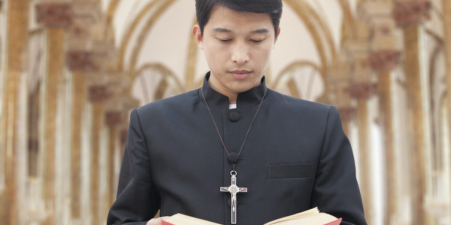Beijing to Damascus: A road to peace?

In a recent feature article in The Australian entitled “Christianity is China’s cross to bear”, Greg Sheridan asked whether Christianity can do for China what capitalism failed to do — namely, soften the harsh Marxist/Leninist/Nationalist atmosphere of Chinese society? Peter Jennings of the Australian Strategic Policy Institute followed up with “China picks up the pace of militarisation”.
So, is China to be friend or foe?
Rising tensions
At the moment, the trade negotiators, business executives and military strategists do not seem to be holding out much hope for anything other than a hot war, a cold war or a trade war; an increasing number of geopolitical experts predict armed conflict between the United States and China sometime in the next 10 years.
Graham Ellison in his seminal work, Destined for War, discusses the inevitability of the “Thucydides Trap”: that is the geopolitical situation in which a rising power (China) is confronted by a ruling power (the U.S) and the result is bloodshed.
This is a conflict Australia would not be able to avoid. It is here that Greg Sheridan underestimates Christianity’s power. Can Christianity soften Chinese society? It can do much more than that.
Judeo-Christian history in China
As Sheridan points out, the number of Christians in China has grown from four million to 100 million in the past 70 years. For this to occur during a period of some of the most savage anti-religious persecutions in modern history is, he says, almost miraculous.
Almost miraculous? It is exactly how Christianity started.
The most savage persecutor of the early Christian church was Saul of Tarsus, later to become St Paul the Apostle, a principal writer of the New Testament. Saul’s conversion on the road to Damascus is etched into history.
Judaism and Christianity are also etched into Chinese history going back more than 4,000 years. For more than 2,000 years — before Abraham, before Moses, before Jesus, before Confucius, before Tao and before Buddha – the Chinese worshipped Shang Di, the “Most High God”, “Creator of Heaven and Earth”.
Numerous Chinese characters, texts and scrolls (Huang Di; Shi Ji; Sima Qian; Feng Shan and many others) bear striking similarities — many identical — to the Judaic Old Testament.
In the 16th century AD, Jesuit missionaries led by Matteo Ricci carried the Gospel to China, resulting in one of China’s greatest emperors, Kang Xi (1654-1722), showing great favour towards Christianity.
These Christian missionaries were also both scientists and mathematicians and, following St Paul’s example in his New Testament Letter to the Corinthians, became immersed in the culture of those they wished to reach. They spoke Chinese, wore Chinese clothes, understood Chinese literature and had great respect for Chinese culture, so much so they became political advisers in the Emperor’s palace.
In the 19th century, British missionary Hudson Taylor followed the same pattern and established the China Inland Mission with great success. Taylor brought nearly 1,000 missionaries to China, establishing schools, hospitals and churches throughout the country, such was the hunger of the Chinese people for Shang Di, the one true God, and for the Gospel of Jesus Christ.
Some of the greatest scholars and experts in all things Chinese, from Ricci to Legge to Taylor, all acknowledged that the Chinese Shang Di, the Hebrew Yahweh, and the Greek Theos were the same God.
Authentic inculturation
At the moment, China is playing the role of Saul of Tarsus, persecuting the church, and, like the early disciples, the church in China is fearful of “the evil being done to the saints” (Acts 9:13). So while trade negotiators and military strategists are trying desperately to work out how best to deal with China, we should not ignore the power of the Gospel.
And if there is to be a Damascene conversion in modern China, Western respect for Chinese culture will be a crucial component.
The transformation of the Soviet Union provided a salutary lesson of what not to do.
Now, I admire the United States as much as the next guy, but Russia’s invitation to the Americans to help transform its economic system following glasnost and perestroika did not go well. Their cultures were incompatible. The Americans did not appreciate the importance of culture the way Ricci and Taylor did.
As the saying goes: “Culture eats strategy for breakfast.”
Conflict or Christianity? Let us pray for the latter.
Bob Day is federal director of the Australian Family Party and a former Senator for South Australia.